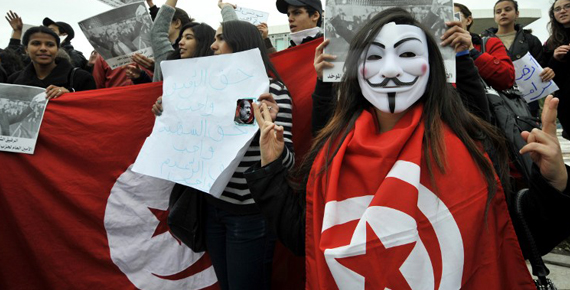After the revolution in Tunisia, both the government change and social-economic developments signal that a second term begins in the wake of an assassination took place in Feb. In the transition period, Ennahda as the winner of the general elections held in Nov. 2011 cooperated with the opposition parties and formed a three-party coalition government ruling the country until Feb. 2013. According to some groups, Tunisia under this government became the country that most successfully completed the transformation period following the Arab Spring. The assassination of a secular prominent politician among the opponents, Shokri Belaid, requires us to re-examine both this success story and whether solutions are sufficiently found to the main issues of the society.
Belaid’s assassination shows, in the first place, that supporters of the old regime still have a deep impact on the society. The old regime gathering around Nida Tounes (the Call for Tunisia) emerges in a way and wants its presence felt.
The atmosphere of mistrust that settled in the country after Belaid’s murder and strikes on rise aim to narrow Ennahda’s elbow room and make revolutionist to eat a humble pie.
Although it’s been two years since the revolution in Tunisia, a new constitution has not been drafted yet. The expectation, however, is that the process will be completed by June. In fact, an election date is determined already, Nov. 27, 2013, but delays in the construction of the Supreme Law might change both the date and the normalization in the country.
Secondly, not a single noticeable change has been made in social-economic dynamics in the post-revolution period. Just last week, a man burned himself to death for hunger and unemployment reasons. International credit rating agencies lowered the country’s note due to political instability. The biggest problem in Tunisia still remains to be earning a living and unemployment. Lack of good moves by the new political actors, such as Ennahda, to expand their social grounds in economic terms helps supporters of the old regime to bring grist to the mill.
Yet another issue that comes into light with the latest developments is the “security,” an Achilles’ heel for all countries in the Arab world. Both the police and the armies; therefore, the old regimes, felt strongest in the area of security. However, Salafi groups’ negative contributions to the new constitution process delay reforms in this particular area, if not make it totally impossible. Clearly, the security reform issue will remain on the agenda in the revolution countries, including Tunisia, in the upcoming term. Political and practical dimensions of the issue make the security reform very difficult yet it should be done without delay. Besides, changing the perception “the internal affairs ministry means terrorist ministry” will not be easy in countries such as Tunisia where such slogans still find supporters.
Although two years have passed over the revolutions, no country – except Egypt- has completed the constitution-making process yet. When it is considered that even the new constitution draft in Egypt did not include a noteworthy gain, compared to the previous one, then a question should be asked about why social dynamics, such as economic transformation, have not been discussed so far. Perhaps the economic transformation would be much more useful for settling the revolution in the long run. Besides, it could also play a key role in the constitution-making. From now on, Tunisia should adopt an approach prioritizing social dynamics without pushing the new constitution process aside. For the course of events cut against the post-revolution actors, such as Ennahda, and facilitates return of the pro-regime supporters.
The new coalition government received vote of confidence last week. Independent names were appointed to key ministries, such as internal affairs, foreign affairs, defense and justice ministries. Therefore, the government has ove


